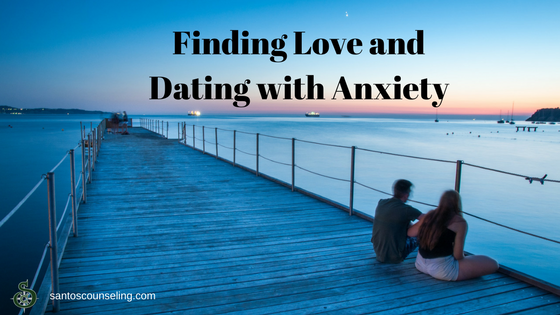My partner has Anxiety. What should I do?
- Are you in a relationship with someone that struggles with Anxiety?
- Are you finding it difficult to understand how to help your partner with Anxiety?
- Do you find yourself taking on roles in the relationship that create emotional pain or stress?
- Do you find yourself having to provide pick me up statements?
Generalized Anxiety Disorder is a mental health disorder that can be seen when someone experiences worry or nervousness, indecisiveness, overthinking, difficulty relaxing, problems focusing and concentrating, a lack of interest for previously pleasurable activities, and/or irregular changes to sleep and appetite.
Physical symptoms of Anxiety that your partner may show include.:
- Fatigue
- Hand tremors
- Sweating
- Stomach aches or nausea
- Restlessness
- Muscle aches or muscle tension
One of the obstacles that accompany dating someone with anxiety is creating a foundation that highlights balance. When I mention balance, I am focusing on the ability to play on roles that are appropriate versus those that create emotional stress. For instance, it would be appropriate for me to provide my partner with a short lesson in Spanish as I am bilingual. However, it would be inappropriate to provide my partner with a physical examination due to my lack of knowledge.
How do I know if I’m helping or hurting my partner with their anxiety?
Take the case study below as an example.:
Kevin often finds that he has to provide his partner, Beth, with reasons to stay calm or why she shouldn’t worry. Kevin does this because Beth often calls in state of panic. Beth feels that she worries a lot and feels that she overthinks plans and situations to the point of the worst-case scenario. Although Kevin has his own issues, he rarely finds time to share them due to spending his time working on ways to improve Beth’s mood. Kevin feels that he walks on egg shells due to not wanting to say anything that would cause Beth to panic or worry. Beth has a history of struggling with uncertainty, worry, her mind going blank, muscle tension, and irritability.
In the case example above, we can note that Beth may be struggling with irregular changes in mood. The irregular changes can be noted to highlight symptoms associated to Generalized Anxiety Disorder. Kevin appears to put himself second and spend much of his time supporting Beth. In addition, Kevin appears to be taking on a role that is expending his energy and even out of his scope of skill.
It would be more appropriate for Beth to have a foundation where she received counseling, engaged in positive coping skills, and established a larger support system.
For support in your relationship click here
How to support your partner with Anxiety?
To create a lasting relationship, partners should take time to focus on what they can do improve the relationship and what needs to be referred out to improve the relationship. If you find that you are acting as your partners counselor or feel exhausted with the amount of emotional work you are taking on, it may be beneficial to seek counseling.
Below are ways to support your partner with depression.:
- Engage in exercise activities together. Examples include going for a walk, yoga or a meditation class.
- Have a weekly board game night
- Take time to watch funny movies where laughter is welcomed
- Include counseling and wellness as part of the foundation of the relationship
- Coloring
- Drawing
- Counting from 0 to 20
Are you finding this information helpful? If so, you may be interested in the relationship building course.
Below are ways to tell your partner what you can do and what you cannot do?
Sharing with your partner that you are not able to help them can be difficult. I find this difficult due to the emotional connection between partners. To aid the process, consider the overall health of the relationship. Take into account the overall damage being done in the long run versus the small win in the moment. For instance, if one is tired and provides a pick me up statement to their partner. The partner may feel better. However, the one that provided the statement is feeling tired and potentially unsure of how long they can continue playing the role.
When you consider helping your partner, focus on direct and indirect support. Helping your partner can come in different forms. You can help your partner directly by being their counselor. You can help your partner indirectly by researching counselors in your city and finding an appropriate match. The direct option would be the one more than likely out of your scope of skill and the one that may lead to unhealthy patterns in the relationship. The indirect option provides the healthiest outcome for you, your partner and the health of the relationship.
Recommendations include:
- Create a list of what you are open to doing versus what you are not.
- Practice voicing your thoughts.
- Share your thoughts if you feel that you are walking on egg shells.
- Evaluate progress bi-monthly.
Dating someone with Generalized Anxiety Disorder is normal. It’s like dating someone that doesn’t like the smell or taste of fish. It’s different. However, it’s not out of this world. I find that taking time to learn all we can about our partner and ourselves provides insight.
Take time to learn how to help each other even if it means that you are not the one directly helping. Take time to give yourself a break without feeling guilt. Find a balance with empathy and mindfulness.
Lastly love each other as often as possible.
If you found this article on Dating and Anxiety helpful, I’d like to recommend the relationship building course. It’s a home-based self-paced relationship course aimed to improve relationships.
Click here to read more about the relationship strengthening course
If you are interested in relationship counseling with Juan Santos. Complete the form below or call 336-707-1723.
When should you see a counselor?
Certain levels of anxiety can be normal. For instance, if you are about to give a speech to a massive audience, you may find yourself experiences hand tremors or as slight stomach ache. I certainly due.
However, when you experience the following symptoms, it’s recommended to seek a counselor.:
- If you experience suicidal thoughts.
- If your anxiety is impacting your ability to work. This can be noted if you can’t concentrate at work and have noticed a decline in your performance.
- If you are using drugs or alcohol to manage the anxiety symptoms.
- If you feel that you are worry too much.
- If you are experiencing panic or anxiety attacks.
- If you do not know how to support your partner with anxiety and would like recommendations.
- If you notice that the anxiety is not going away.
As you are reading over the symptoms, I like to welcome you to reach out for concerns. If you are unsure about relationship counseling or if you have Generalized Anxiety Disorder, please email me at ([email protected]). I’ll gladly go over your concerns and do my best to lead you in the right direction.




